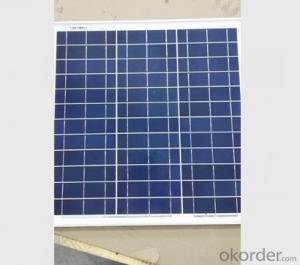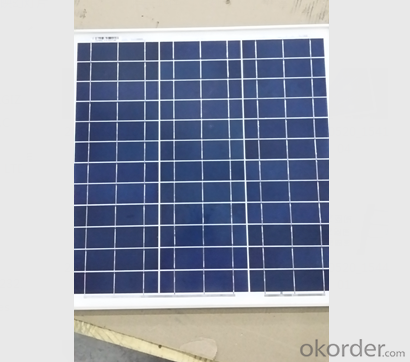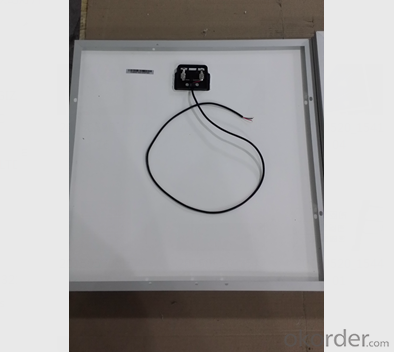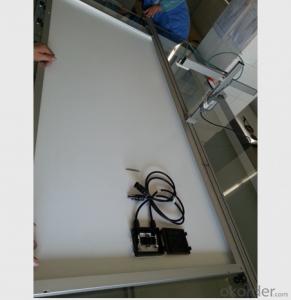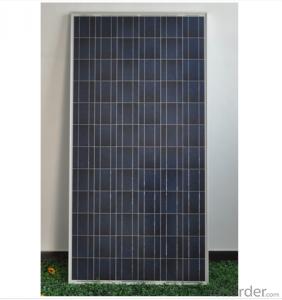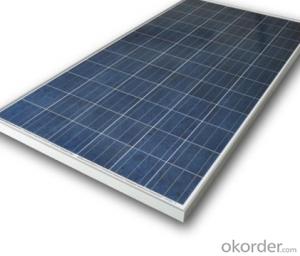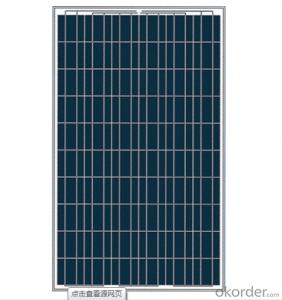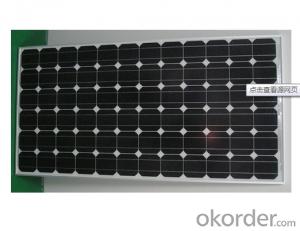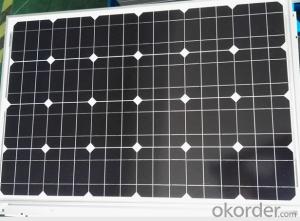Solar Panels Kent - Polycrystalline Solar Panel CNPV-32W High Performance 36 Cell
- Loading Port:
- Shanghai
- Payment Terms:
- TT OR LC
- Min Order Qty:
- 25 pc
- Supply Capability:
- 100000 pc/month
OKorder Service Pledge
OKorder Financial Service
You Might Also Like
Product Description:
Solar Polycrystalline Series Panels
Introduction of Solar Polycrystalline Series Panels
CNBM Solar photovoltaic (PV) Panel is designed for large electrical power requirements. It is the optimal choice for both on-grid and off-grid power systems. CNBM Solar panel offers high performance of power per square foot of solar array. Monocrystalline silicon(c-Si): often made using the Czochralski process. Single-crystal wafer cells tend to be expensive, and because they are cut from cylindrical ingots, do not completely cover a square solar cell module without a substantial waste of refined silicon. Hence most c-Si panels have uncovered gaps at the four corners of the cells.
Standard Test Conditions of Solar Polycrystalline Series Panels
The opto-electrical specifications shown below are stabilized values being measured at Standard Test Conditions, Irradiance: 1000W/m2, Spectrum: AM1.5 at 25°C, The info below is subject to manufacturing tolerances. Where appropriate minutes of measurement are available and are used for the dimensioning of the installation.
Advantages of Solar Polycrystalline Series Panels
• Solar performance guarantees for 25 years
• 5 years guarantee for workmanship
• Timeliness of delivery
Characteristics of Solar Polycrystalline Series Panels
Max Power Voltage Vmp (V) | 18V |
Max Power Current Imp (A) | 1.84A |
Open Circuit Voltage Voc (V) | 21V |
Short Circuit Current Isc (A) | 1.99A |
Max Power Pm (W) | 32W |
Temperature Coefficient of Cells
NOCT | 47℃±2℃ |
Temperature Coefficients of Isc (%/℃) | 0.064 |
Temperature Coefficients of Voc (%/℃) | -0.33 |
Temperature Coefficients of Pmp (%/℃) | -0.45 |
Mechanical Data Solar Polyocrystalline Series
Power | 32W |
Dimension | 517×517×18mm |
Weight | 4kg |
Tolerance | ±3% |
The dimension of the modules can be changed according to the demand of clients
Limits
Operating Temperature | –40 °C to +85°C |
Storage Temperature | –40 °C to +85°C |
Max System Voltage | 700V |
Guarantee Solar Polyocrystalline Series Panels
Products Guarantee | 5 yrs free from defects in materials and workmanship |
Performance Guarantee | No less than 90% within 10yrs and no less than 80% within 25yrs |
Certificates | UL, IEC, ISO, TUV, CE |
The Examination of Solar Polyocrystalline Series Panels
FAQ
We have organized several common questions for our clients,may help you sincerely:
①What price for each watt?
It depends on the quantity, delivery date and payment terms, it should be discussed in peticular.
②What is your size for each module? Can you tell me the Parameter of your module?
We have different series of panels in different output, both c-Si and a-Si. Please take the specification sheet for your reference. Or you can check the above data for your reference.
③Can you provide the peripheral products of the solar panels, such as the battery, controller, and inverter? If so, can you tell me how do they match each other?
Yes, we can, and we will need some specified data for our design.
④What is your warranty system?
Our product performance guarantees for 25 years, includes 5 years guarantee for workmanship
⑤How do you pack your products?
We have rich experience on how to pack the panels to make sure the safety on shipment when it arrives at the destination.
- Q: K i'm almost ready to give up! I've bought every kind of pv I can think of, and I can see this technology will not be affordable in my lifetime.I conserve all I can (so far as to handwashing my laundry etc) I'm not rich, but I'm saving for a solar pv with decent amperage. I love tinkering with things if I see the point.All the cells i've seen are very weak. What PV would you buy? (all I need is to power my computer from a deep cycle 2 volt battery connected to an inverter)God Bless You
- Solar okorder /
- Q: I mean like bread is made of wheat, what are solar panels made up of?How are they manufactured?
- Solar panels (aka photovoltaic panel) are most often made up of thin wafers of crystalline silicon or cadmium telluride. As photons from the sun enter the photovoltaic cell, electrons are freed from the substrate when are then collected by wires that run throughout the panel. And as we know electrons=electricity!
- Q: does it mean that it can get that much in a day? Or like, in an hour?
- watt is a measurement of energy watt=3.4 BTU BTU(British thermal unit )=amount of energy to raise pound water degree f. us gallon water = 8.33 lbs can gallon water = 0 lbs depending if 0vac then a solar panel can light a 00 watt bulb or 6 5watt high efficiency bulbs
- Q: Can solar panels power an entire house?
- Yes, solar panels can power an entire house. The number of panels required depends on the energy needs of the house and the amount of sunlight available in the area. However, with proper installation and integration of a solar panel system, it is possible to generate enough electricity to meet the needs of an entire house, including appliances, lighting, heating, and cooling systems.
- Q: Can solar panels be installed on outdoor event venues?
- Yes, solar panels can be installed on outdoor event venues. In fact, they are often a great choice for such venues as they can provide renewable energy to power various event equipment, lighting, and sound systems. Additionally, solar panels can help reduce the environmental impact of hosting events by reducing reliance on fossil fuels and decreasing carbon emissions.
- Q: Can solar panels be used to power a drone?
- Yes, solar panels can be used to power a drone. By harnessing sunlight, the solar panels can convert the energy into electrical power that can be used to charge the drone's batteries or directly power its motors. This enables drones to have longer flight times and potentially operate in remote areas without the need for frequent battery replacements. However, the practicality and effectiveness of solar-powered drones may depend on factors such as the size and efficiency of the solar panels, weather conditions, and the power requirements of the drone.
- Q: I'm writing a lab and I have to put information about solar panels in it. The history, who started them, why they are useful etc. any good sites that can help me?
- I had solar panels installed in the beginning of the fall and I'm a big fan of them! I therefore know some info but I'm not sure if it would really be enough for you. Heres what I know: you save lots of money because you get federal tax credits and state rebates, and you help keep the environment green. The place that installed my solar panels has a lot of info that may be applicable to you, on their website or you can call them @ 866-276-7222 - they have great costumer service!
- Q: Can solar panels be used on vehicles?
- Yes, solar panels can be used on vehicles. They can be installed on the roofs or hoods of cars, trucks, and even boats to harness solar energy and charge the vehicle's battery or power various electrical systems. This helps reduce reliance on fossil fuels and make vehicles more sustainable and energy-efficient.
- Q: How do solar panels affect the property's energy management strategy?
- Solar panels can significantly impact a property's energy management strategy by providing renewable and clean energy. By harnessing the power of the sun, solar panels can reduce dependency on traditional energy sources, lower electricity costs, and promote sustainability. The excess energy generated by solar panels can be stored or sold back to the grid, further optimizing energy management. Additionally, solar panels can enhance a property's overall value and reputation, making it more attractive to environmentally conscious consumers.
- Q: How do solar panels affect roof weight load?
- Solar panels can increase the weight load on a roof, but their impact is generally minimal. The weight of solar panels is usually evenly distributed across the roof surface, and most roofs are designed to handle this additional load without any issues. However, it is recommended to consult with a professional to assess the roof's structural integrity and ensure it can support the added weight of solar panels.
Send your message to us
Solar Panels Kent - Polycrystalline Solar Panel CNPV-32W High Performance 36 Cell
- Loading Port:
- Shanghai
- Payment Terms:
- TT OR LC
- Min Order Qty:
- 25 pc
- Supply Capability:
- 100000 pc/month
OKorder Service Pledge
OKorder Financial Service
Similar products
Hot products
Hot Searches
Related keywords
